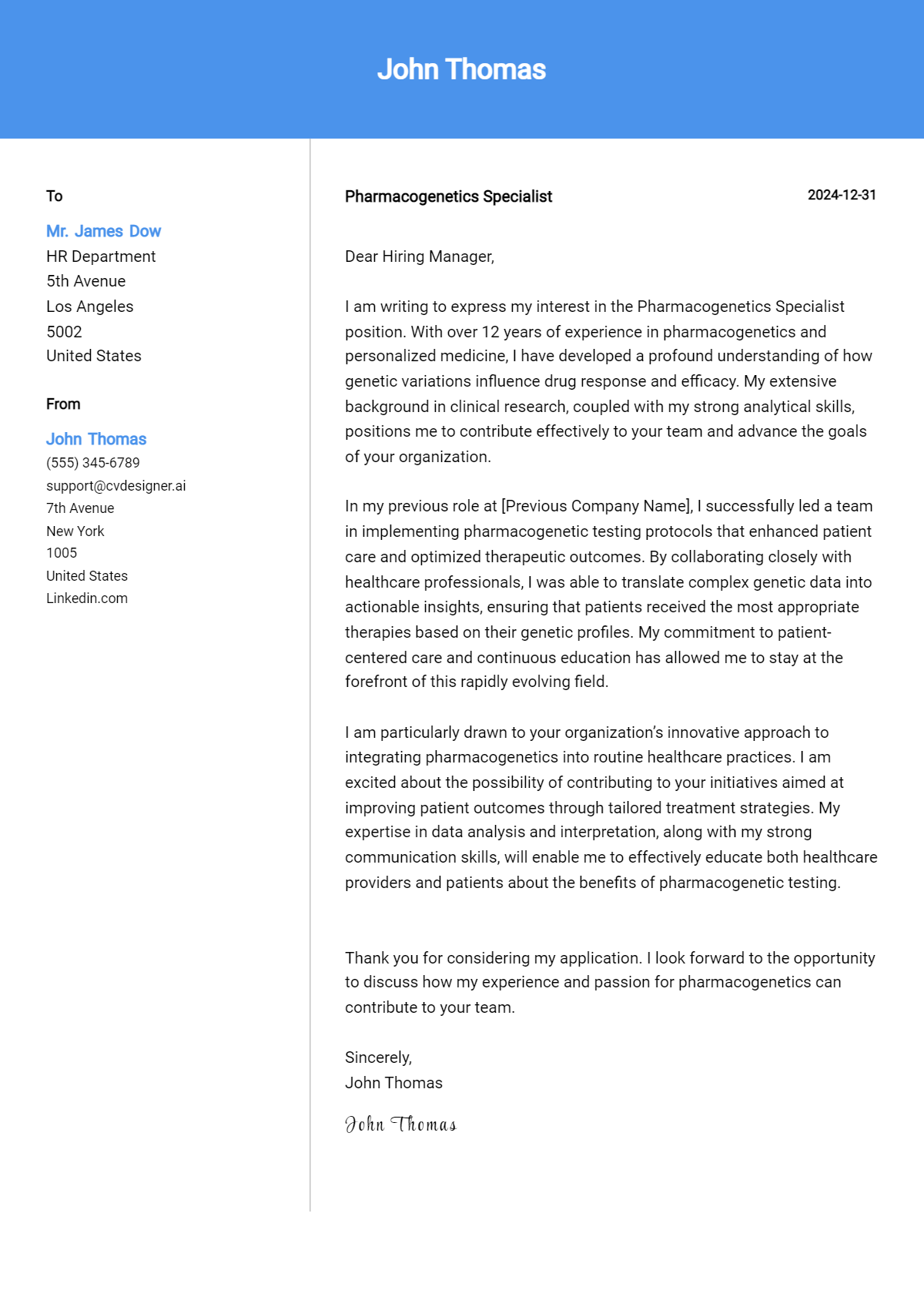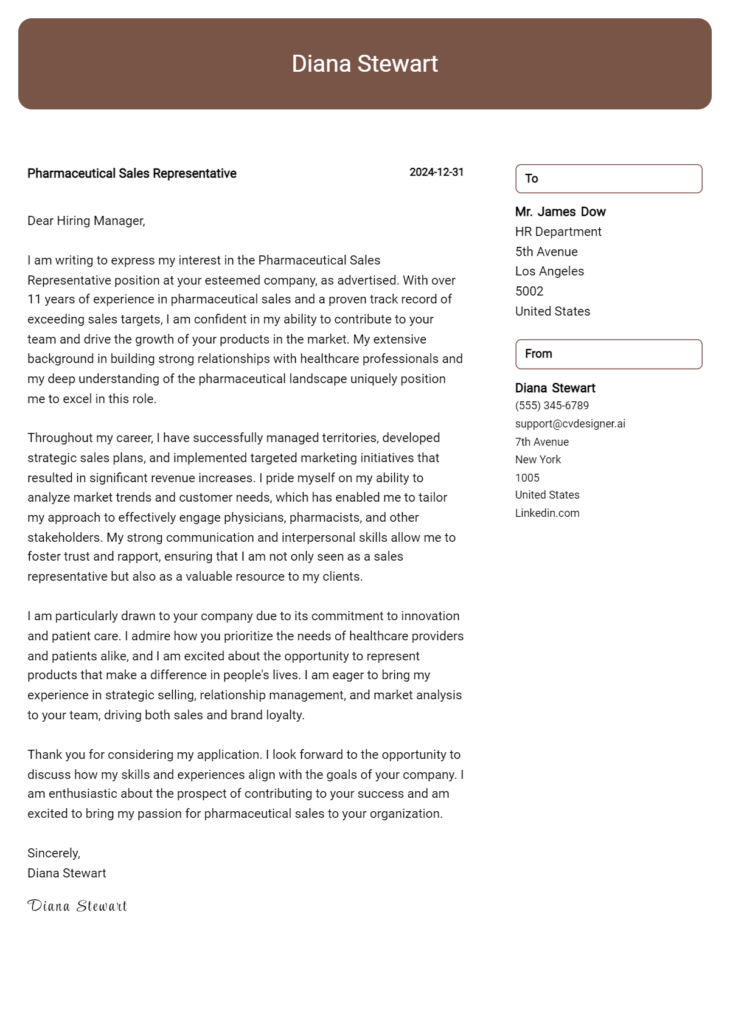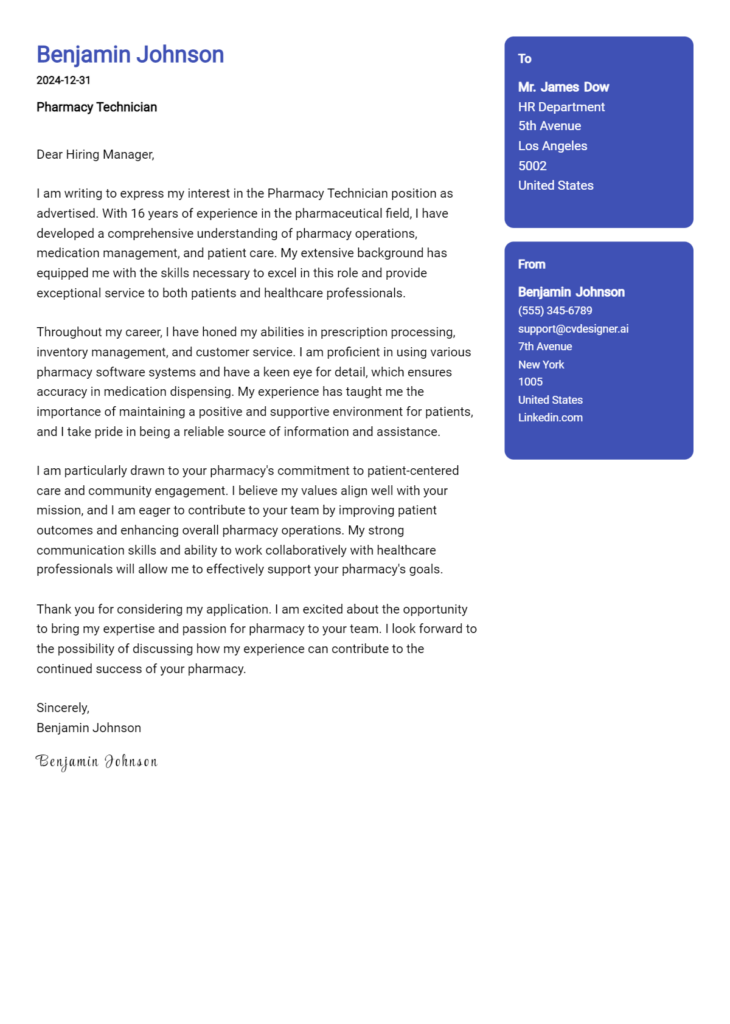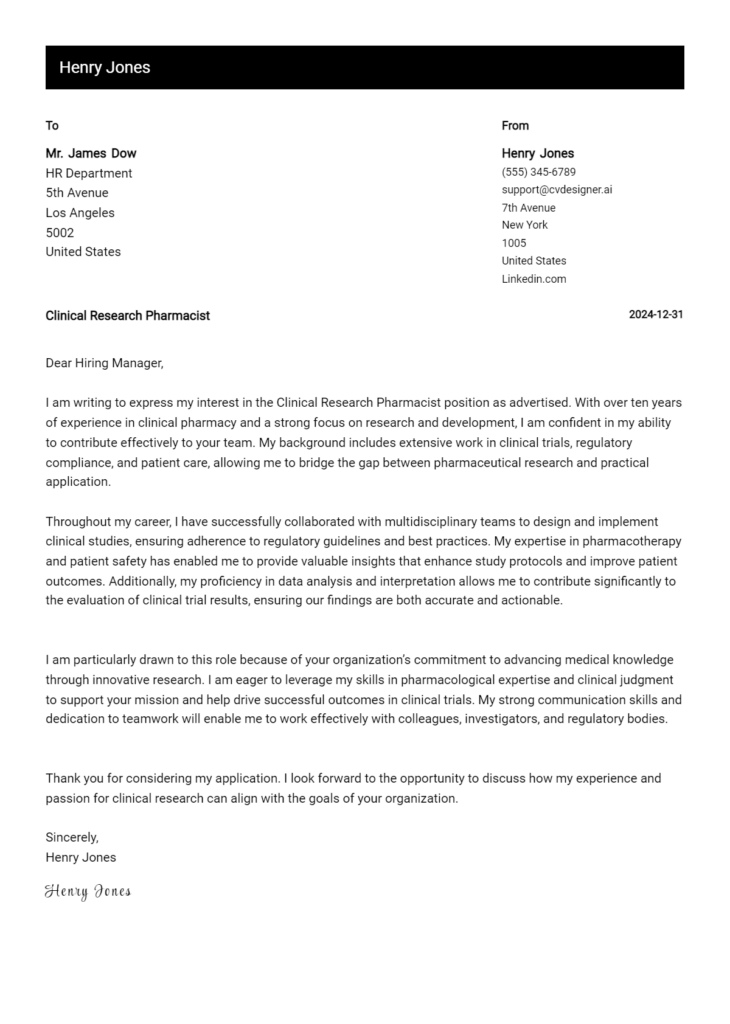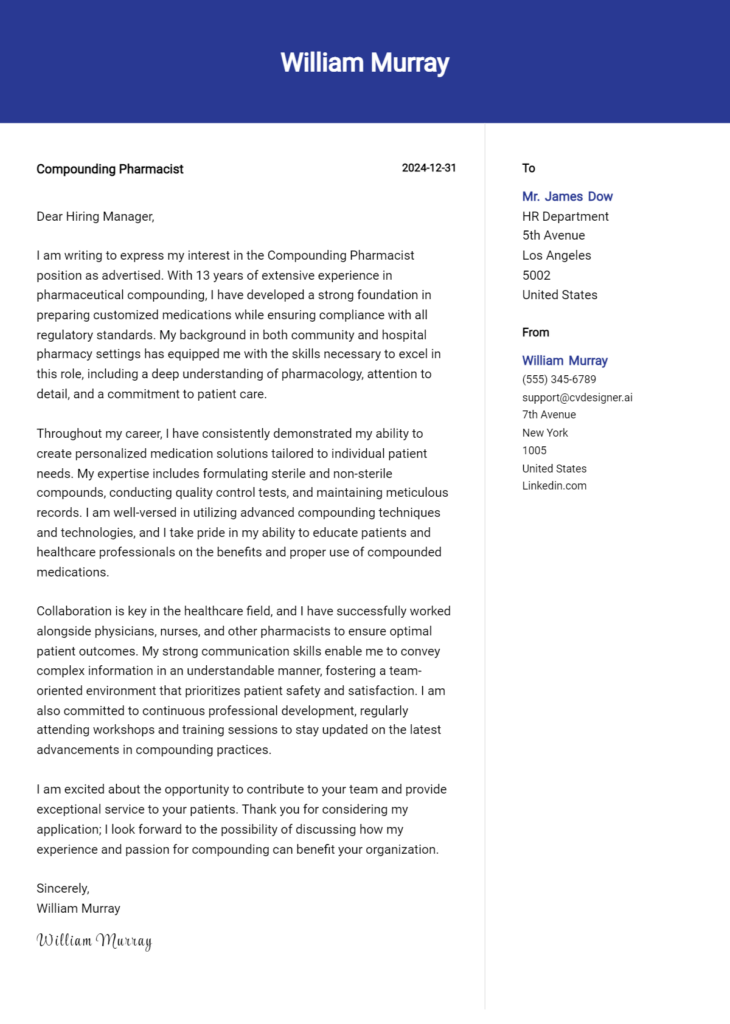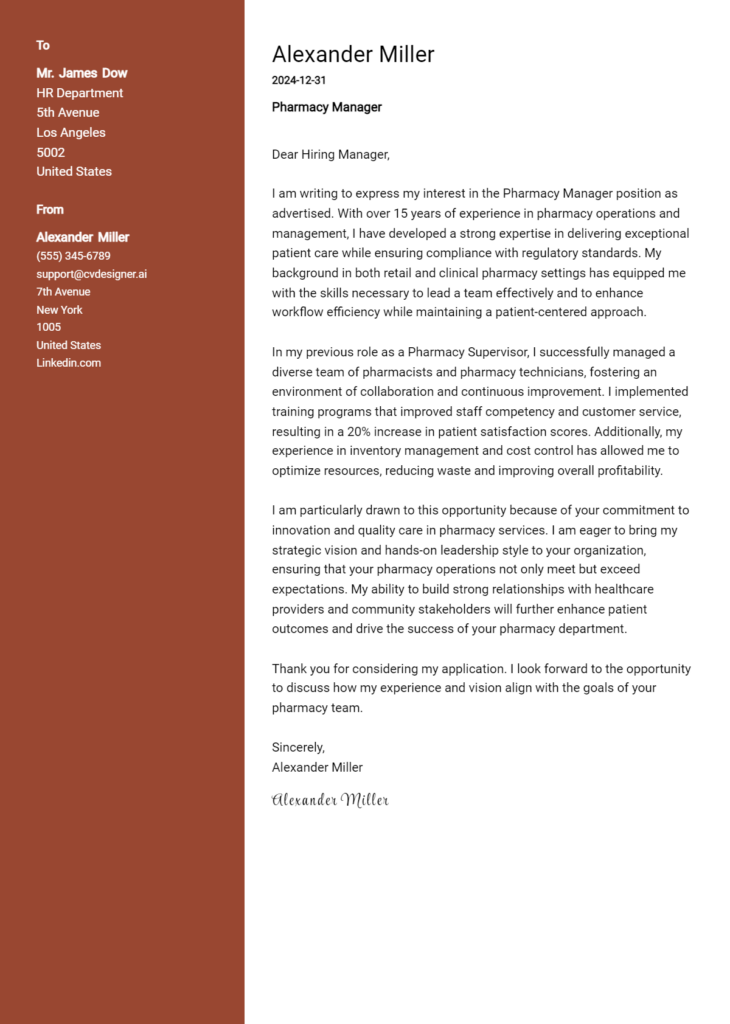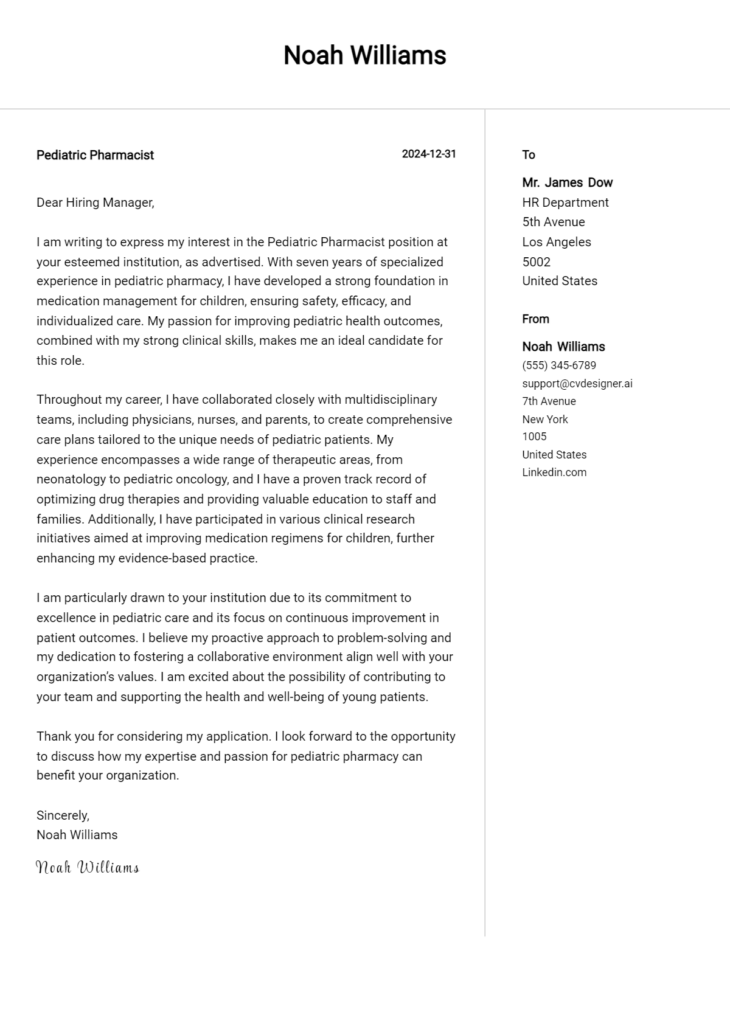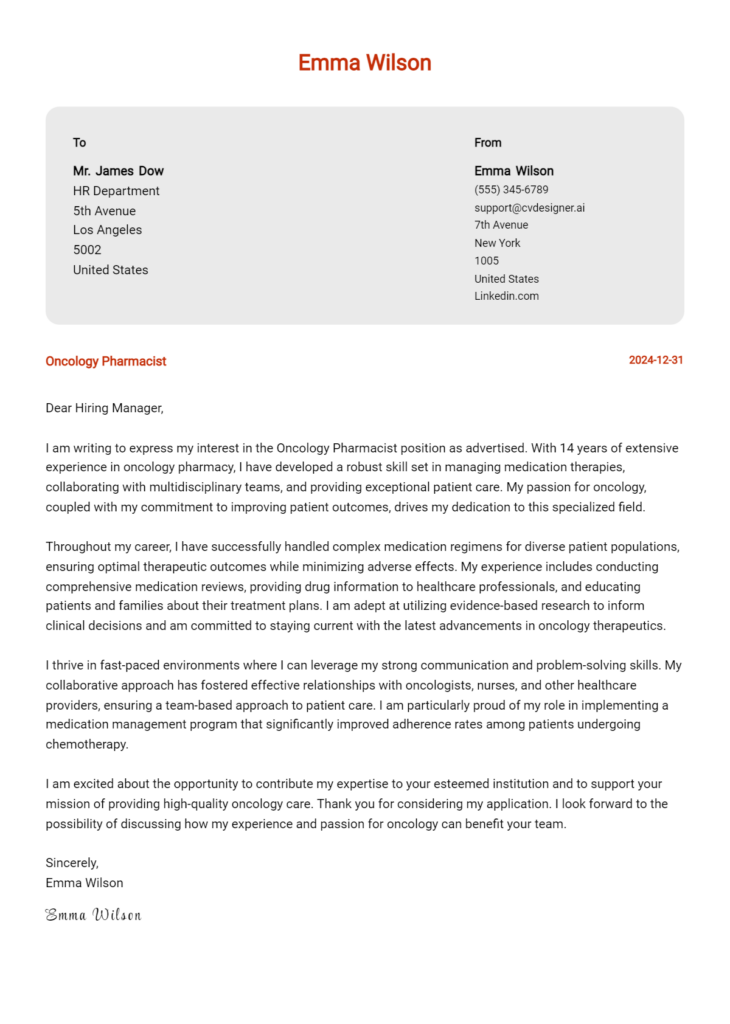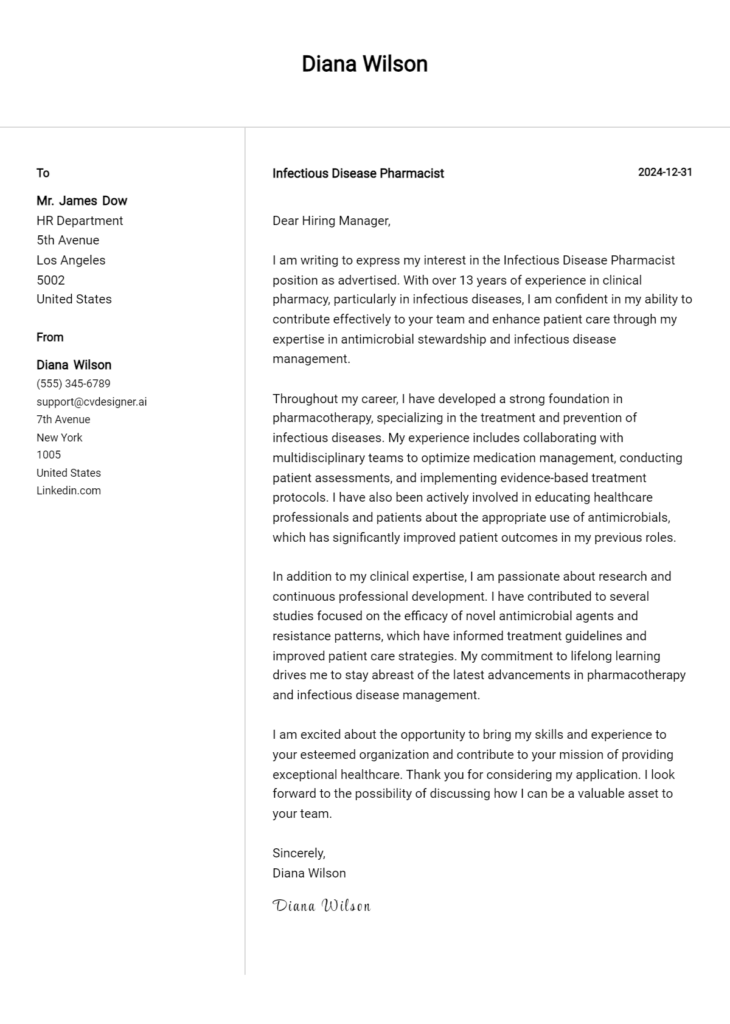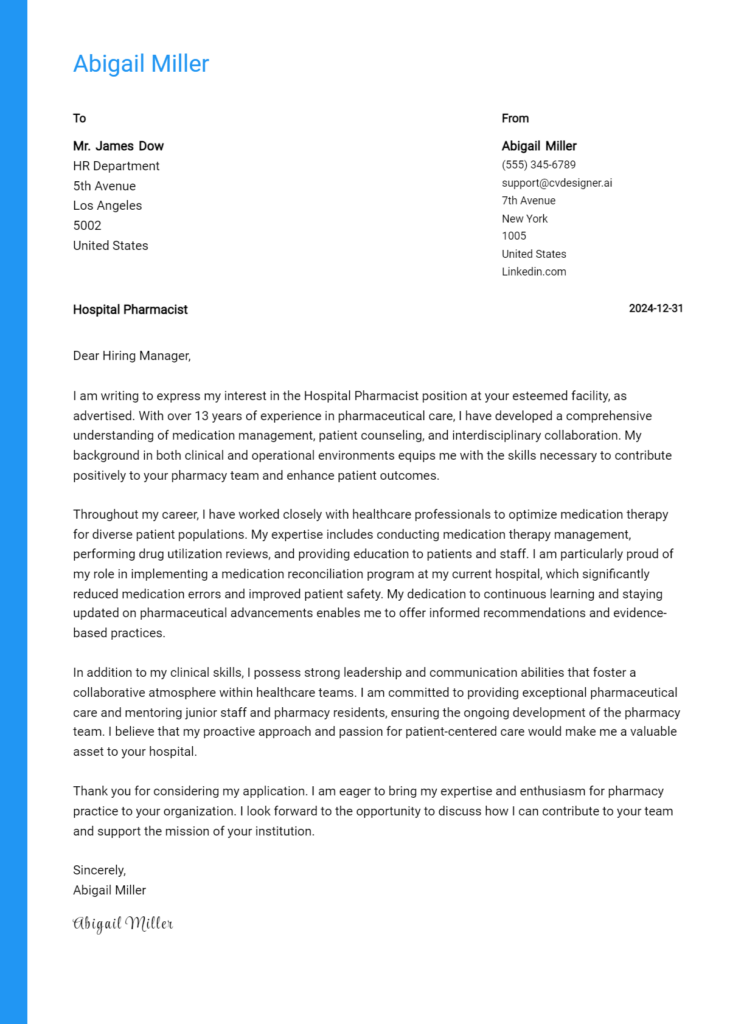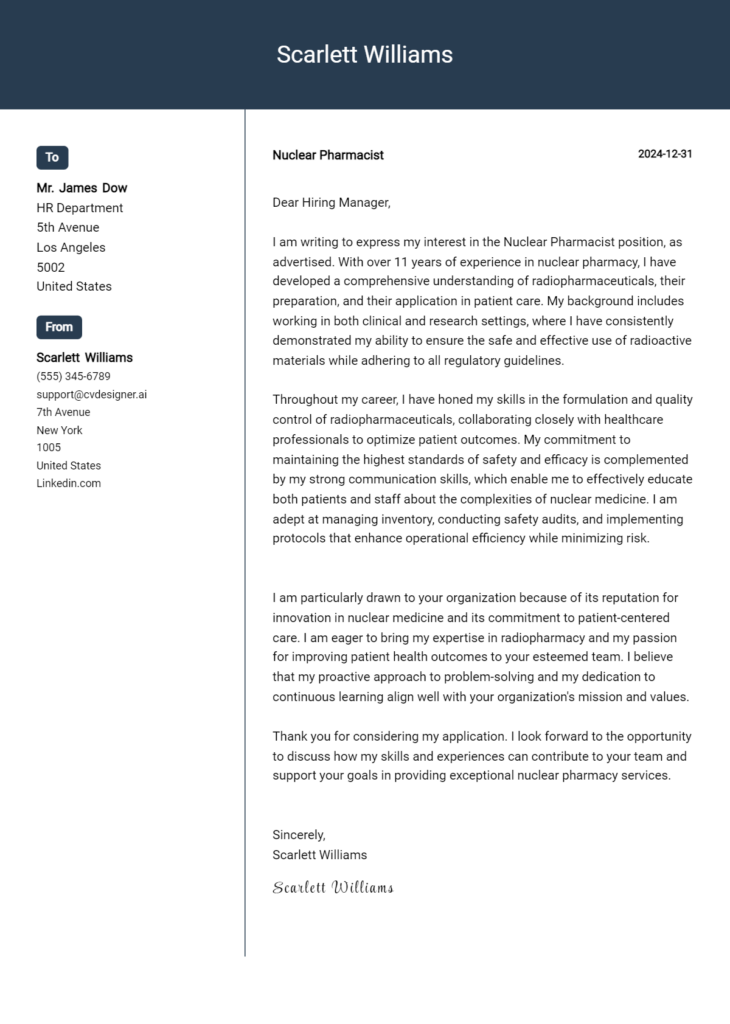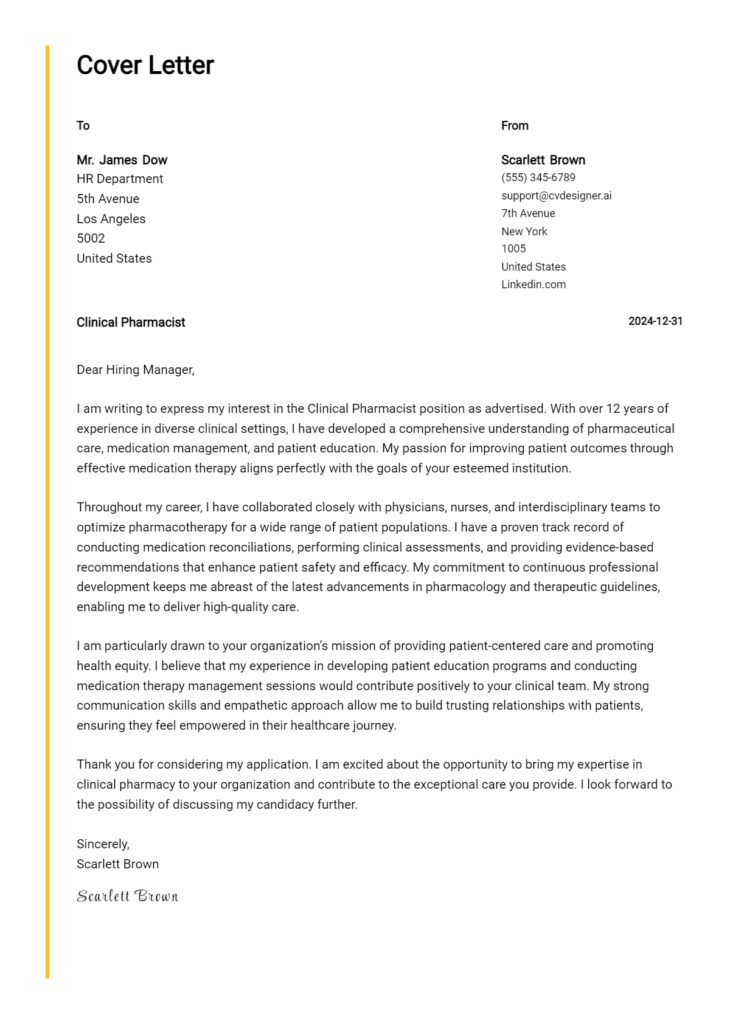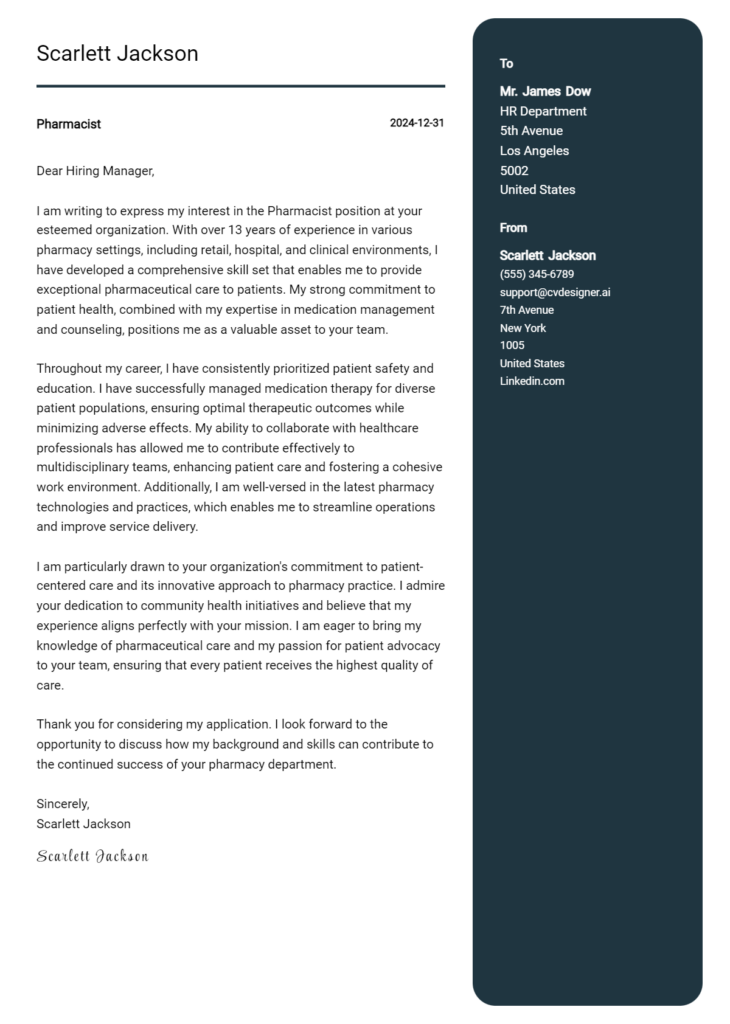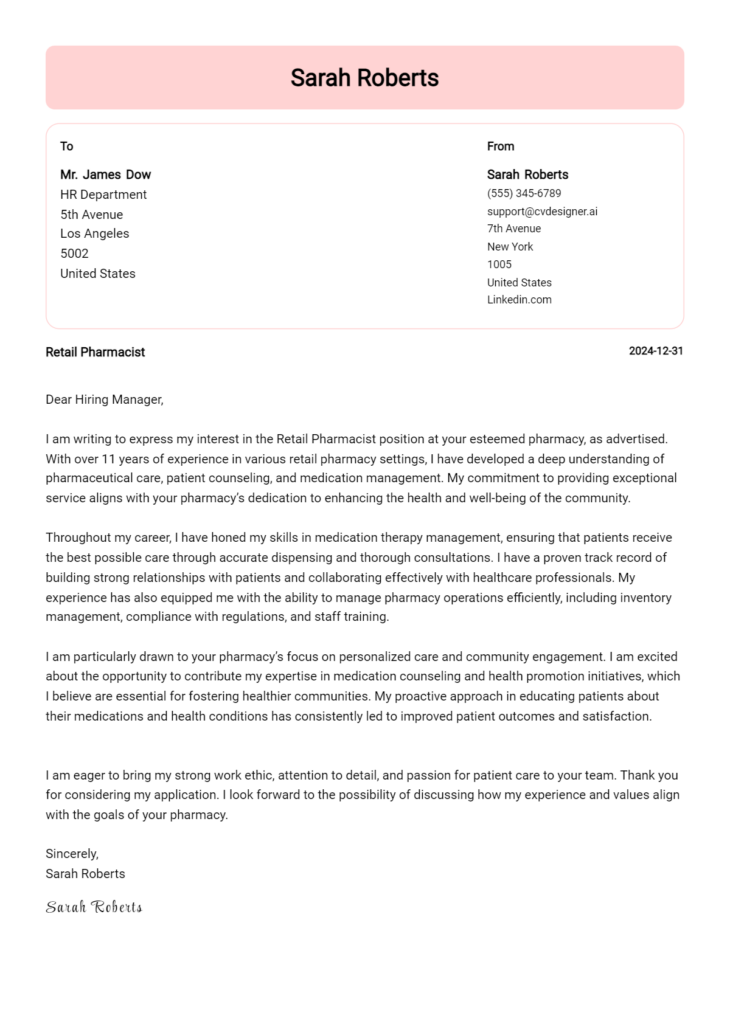Pharmacogenetics Specialist Cover Letter Examples
Explore additional Pharmacogenetics Specialist cover letter samples and guides and see what works for your level of experience or role.
How to Format a Pharmacogenetics Specialist Cover Letter?
Crafting a compelling cover letter is essential for a Pharmacogenetics Specialist, as it serves as your first opportunity to impress potential employers with your expertise and professionalism. The format of your cover letter not only reflects your knowledge of genetic medicine but also demonstrates your ability to communicate complex information clearly and effectively. A well-structured cover letter can capture the attention of hiring managers and set you apart in a competitive field, allowing you to showcase your analytical skills and attention to detail—crucial traits in pharmacogenetics.
In this guide, we'll outline how to structure your cover letter, providing specific insights and examples tailored for Pharmacogenetics Specialists to help you create a persuasive document.
We will focus on the essential components of a professional cover letter, including:
- Cover Letter Header
- Cover Letter Greeting
- Cover Letter Introduction
- Cover Letter Body
- Cover Letter Closing
Each section plays a crucial role in highlighting your qualifications and professionalism. Let’s break down each part and explain how to make your cover letter shine in the pharmacogenetics field.
Importance of the Cover Letter Header for a Pharmacogenetics Specialist
A well-structured cover letter header is crucial for a Pharmacogenetics Specialist as it sets the tone for the entire document and establishes a sense of professionalism. The header should include essential information such as your contact details, the date, and the recipient's information. Clarity in this section is vital, as it ensures that your application is easily identifiable and accessible to the hiring manager. A strong header not only reflects your attention to detail but also demonstrates your understanding of professional communication standards in the healthcare field.
Below are examples of a strong and a weak cover letter header for a Pharmacogenetics Specialist:
Strong Example
John Doe 123 Main Street Cityville, ST 12345 johndoe@email.com (123) 456-7890 October 1, 2023 Dr. Jane Smith Director of Human Genetics XYZ Medical Center 456 Healthcare Ave Cityville, ST 12345
Weak Example
John D. johndoe@email.com 10/1/23 To Whom It May Concern,
The Importance of a Strong Cover Letter Greeting for a Pharmacogenetics Specialist
The greeting of your cover letter plays a crucial role in establishing the tone for the rest of your message. It serves as your first impression, demonstrating both professionalism and personalization by directly addressing the hiring manager. A well-crafted greeting can set a positive tone and convey your enthusiasm for the position, while a generic or impersonal approach can detract from the overall quality of your application. To make a strong impact, it's essential to avoid generic greetings like "To Whom It May Concern." Instead, take the time to research the recipient's name, which shows your initiative and genuine interest in the role.
Here are some examples of strong and weak greetings for a Pharmacogenetics Specialist cover letter:
Strong Greeting Example
Dear Dr. Smith,
Weak Greeting Example
To Whom It May Concern,
The Importance of a Strong Cover Letter Introduction for a Pharmacogenetics Specialist
A well-crafted cover letter introduction is crucial for a Pharmacogenetics Specialist, as it sets the tone for the entire application and establishes the candidate's relevance for the role. In this highly specialized field, where understanding the genetic basis of drug response is vital for personalized medicine, the introduction must not only capture the hiring manager's attention but also express genuine interest in the position. Additionally, it should briefly showcase key skills or achievements that align with the job requirements, demonstrating the candidate's unique qualifications. Here are examples of strong and weak cover letter introductions:
Strong Example
Dear [Hiring Manager's Name], As a dedicated Pharmacogenetics Specialist with over five years of experience in genomic medicine and a proven track record of improving patient outcomes through personalized drug therapies, I am excited to apply for the role at [Company Name]. My passion for integrating genetic insights into clinical practice, combined with my expertise in interpreting pharmacogenomic data, makes me a perfect fit for your team. I am eager to contribute my skills in research and patient care to advance your mission of precision medicine.
Weak Example
To Whom It May Concern, I am writing to apply for the Pharmacogenetics Specialist position. I have a background in genetics and some experience in the pharmaceutical field. I believe I could be a good fit for the job.
Purpose of the Cover Letter Body for a Pharmacogenetics Specialist
The body of the cover letter for a Pharmacogenetics Specialist serves as a critical platform for the candidate to articulate their relevant skills, experiences, and the unique value they bring to the organization. It allows the applicant to highlight specific projects or accomplishments that demonstrate their expertise in pharmacogenetics, such as successful implementation of genetic testing programs or collaborations with healthcare providers that improved patient outcomes. By providing concrete examples of their contributions, candidates can effectively convey their capability to contribute to the company's goals and advance personalized medicine initiatives.
Strong Example
Dear Hiring Manager, I am excited to apply for the Pharmacogenetics Specialist position at XYZ Healthcare. In my previous role at ABC Genetics, I successfully led a project that implemented a pharmacogenomic screening program for over 1,000 patients, resulting in a 30% increase in medication efficacy and a significant reduction in adverse drug reactions. My collaborative efforts with oncologists and primary care physicians not only enhanced patient care but also established a framework that is now being adopted across multiple departments. My passion for integrating genetic data into clinical practice drives my commitment to advancing personalized medicine at your esteemed organization.
Weak Example
Dear Hiring Manager, I am applying for the Pharmacogenetics Specialist position. I have some experience in genetics and think I would be a good fit. In my last job, I did some work on genetic tests, but I don't remember the specifics. I am really interested in pharmacogenetics and would love to join your team.
Importance of the Cover Letter Closing for a Pharmacogenetics Specialist
The closing paragraph of a cover letter serves as a crucial opportunity to leave a lasting impression on potential employers. It should effectively summarize your qualifications, reiterate your enthusiasm for the Pharmacogenetics Specialist role, and encourage the next steps in the hiring process, such as reviewing your resume or scheduling an interview. A strong closing can reinforce your fit for the position and your eagerness to contribute to the organization, while a weak closing may leave the employer with unanswered questions or a lack of motivation to pursue your application further.
Strong Example
Thank you for considering my application for the Pharmacogenetics Specialist position. With my extensive background in pharmacogenomics and personalized medicine, I am excited about the opportunity to contribute to your team at [Company Name]. I am confident that my skills in interpreting genetic data and my passion for improving patient outcomes align perfectly with your goals. I look forward to the possibility of discussing my application further and am eager to provide additional insights during an interview. Please feel free to review my resume for more details on my qualifications.
Weak Example
Thanks for reading my letter. I think I would be okay for the Pharmacogenetics Specialist job. If you want, you can look at my resume. I hope to hear from you soon, but no rush.
These tips will assist candidates in crafting an effective cover letter for a Pharmacogenetics Specialist position. A well-written cover letter is crucial as it allows you to highlight your technical skills, problem-solving abilities, knowledge of the Software Development Life Cycle (SDLC), teamwork experience, and a genuine passion for continuous learning in the field of pharmacogenetics. By following these guidelines, you can create a compelling narrative that resonates with potential employers.
Cover Letter Writing Tips for Pharmacogenetics Specialist
Showcase Your Technical Skills
Clearly outline your technical expertise in pharmacogenetics, including relevant laboratory techniques, software proficiency, and data analysis skills. Mention specific tools or technologies you are familiar with, such as genomic sequencing platforms or bioinformatics software. This demonstrates to employers that you possess the requisite skills to excel in the role.Emphasize Problem-Solving Abilities
Highlight instances where you have successfully tackled complex problems in your previous roles. Provide examples of how you approached these challenges, the methodologies you employed, and the outcomes of your efforts. This not only shows your analytical capabilities but also your ability to contribute positively to research and clinical settings.Demonstrate Knowledge of SDLC
If applicable, detail your understanding of the Software Development Life Cycle (SDLC) and how it relates to pharmacogenetics projects, particularly if you have experience in developing software solutions for genetic data analysis. Mention any experience with agile methodologies or project management frameworks to showcase your adaptability and organizational skills.Highlight Teamwork Experience
Pharmacogenetics often involves collaboration with multidisciplinary teams. Share examples of how you have effectively worked in teams, whether in research, clinical settings, or industry projects. Discuss your role, how you contributed to the team’s success, and how you navigated any conflicts or challenges that arose.Express a Passion for Continuous Learning
The field of pharmacogenetics is rapidly evolving, and a commitment to lifelong learning is essential. Mention any recent courses, certifications, or workshops you have attended that are relevant to the position. Highlight your enthusiasm for staying updated with the latest research and advancements in the field, showing potential employers that you are proactive about your professional development.
For further assistance in creating your cover letter, consider exploring cover letter templates or utilizing a cover letter builder to craft a polished and professional document that aligns with your career aspirations.
Common Mistakes to Avoid in a Pharmacogenetics Specialist Cover Letter
Crafting a compelling cover letter is essential for a Pharmacogenetics Specialist position, as it serves as your personal introduction to potential employers. Avoiding common mistakes can significantly enhance your chances of making a positive impression. Here are some pitfalls to watch out for:
Generic Greeting: Using "To Whom It May Concern" can make your letter feel impersonal. Instead, research the hiring manager's name to personalize your greeting.
Lack of Specificity: Failing to mention specific pharmacogenetics skills or experiences can dilute your application. Tailor your letter to highlight relevant qualifications and achievements.
Repetition of Resume: Simply restating your resume in the cover letter is redundant. Use this opportunity to provide context and elaborate on key experiences that showcase your suitability for the role.
Ignoring Formatting Guidelines: Neglecting professional formatting can undermine your letter's effectiveness. Follow a clear cover letter format to ensure readability and professionalism. Check out this guide on cover letter format.
Grammatical Errors: Typos and grammatical mistakes can detract from your professionalism. Always proofread your letter multiple times or consider using tools to check for errors.
Overemphasis on Salary or Benefits: Focusing too much on compensation can give the wrong impression. Instead, emphasize your passion for pharmacogenetics and how you can contribute to the organization.
Lack of a Strong Closing: A weak conclusion can leave a negative impression. Ensure to reiterate your enthusiasm for the position and include a call to action, such as expressing a desire for an interview.
By avoiding these common mistakes, you can create a strong cover letter that effectively showcases your qualifications for a Pharmacogenetics Specialist role. For more inspiration, consider reviewing these cover letter examples.
Cover Letter FAQs for Pharmacogenetics Specialist
What should I include in my cover letter as a Pharmacogenetics Specialist?
Your cover letter should highlight your relevant education, training, and experience in pharmacogenetics. Start with an introduction that captures the reader’s attention and clearly states your interest in the position. Include specific examples of your expertise in genetic testing, data analysis, and personalized medicine. Mention any certifications or relevant coursework you've completed. It's also important to demonstrate your understanding of the latest advancements in pharmacogenetics and how they can improve patient care. Additionally, showcase your interpersonal skills, as collaboration with healthcare teams is vital in this role. Tailor your letter to the specific job description, emphasizing how your background uniquely qualifies you for the position.
How can I demonstrate my passion for pharmacogenetics in my cover letter?
To effectively convey your passion for pharmacogenetics, share personal anecdotes or experiences that led you to this field. Discuss any relevant research projects, internships, or volunteer work that ignited your interest in personalized medicine and genetic testing. You can also mention any specific cases or patients that have inspired you to pursue this career path. Additionally, express your commitment to advancing the field through continuous learning and staying updated on emerging technologies and methodologies. Highlighting your dedication to improving patient outcomes through pharmacogenetics will resonate with potential employers and demonstrate your enthusiasm for the specialty.
Should I mention specific technical skills in my cover letter?
Absolutely! Highlighting specific technical skills in your cover letter is essential for a Pharmacogenetics Specialist role. Include proficiency in genetic analysis tools, bioinformatics software, and laboratory techniques relevant to pharmacogenetics. Mention any experience you have with interpreting genetic test results, as well as your ability to communicate complex genetic information to healthcare providers and patients. Additionally, if you have experience with electronic health records (EHR) or clinical decision support systems, be sure to include that as well. Tailor your skills to align with the job description, ensuring that you demonstrate how your technical expertise will contribute to the success of the organization.
How long should my cover letter be?
Your cover letter should be concise and focused, ideally one page in length. Aim for three to four paragraphs that clearly articulate your qualifications and interest in the Pharmacogenetics Specialist position. Avoid lengthy explanations or unnecessary details; instead, prioritize the most relevant experiences and skills that align with the job requirements. A well-structured cover letter that respects the reader’s time will leave a positive impression. Use clear language and active voice to convey your message effectively. Remember, the goal is to entice the employer to want to learn more about you in an interview, so keep it engaging yet succinct.
Build your Cover Letter in minutes
Use an AI-powered cover letter builder and have your letter done in 5 minutes. Just select your template and our software will guide you through the process.

